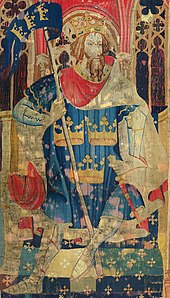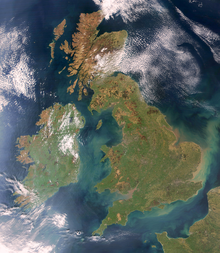| Revision as of 22:32, 21 August 2014 editGideonF (talk | contribs)Extended confirmed users861 edits Undid revision 622251421 by Snowded (talk) word "progressive" does not appear the one cited source that is not a broken link. OR.← Previous edit |
Revision as of 20:58, 23 August 2014 edit undoSnowded (talk | contribs)Extended confirmed users, Pending changes reviewers, Rollbackers37,634 edits It took two seconds to find one which did, not that it was really needed anywayNext edit → |
| Line 7: |
Line 7: |
|
British nationalism's identity of British descends from the ] who dwelt on the island of ].<ref>Guntram H. Herb, David H. Kaplan. Nations and Nationalism: A Global Historical Overview: A Global Historical Overview. Santa Barbara, California, USA: ABC-CLIO, 2008.</ref> British nationalism grew to include people outside of Great Britain, on the island of ], because of the ], which declared that the crown of Ireland was to be held by the ruling monarch of ]. Also there were ] calls for unity with Britain.<ref>Brendan Bradshaw, Peter Roberts. British Consciousness and Identity: The Making of Britain, 1533-1707. P. 302.</ref> However with the ] a schism arose in the British Isles between ] and ] that was especially strong in Ireland, that led to ] and demands for Irish independence from Britain, the largely Catholic ] was granted independence by the British government, while the largely Protestant ] remained within the United Kingdom.{{Citation needed|date=February 2014}}{{Dubious|date=February 2014}} |
|
British nationalism's identity of British descends from the ] who dwelt on the island of ].<ref>Guntram H. Herb, David H. Kaplan. Nations and Nationalism: A Global Historical Overview: A Global Historical Overview. Santa Barbara, California, USA: ABC-CLIO, 2008.</ref> British nationalism grew to include people outside of Great Britain, on the island of ], because of the ], which declared that the crown of Ireland was to be held by the ruling monarch of ]. Also there were ] calls for unity with Britain.<ref>Brendan Bradshaw, Peter Roberts. British Consciousness and Identity: The Making of Britain, 1533-1707. P. 302.</ref> However with the ] a schism arose in the British Isles between ] and ] that was especially strong in Ireland, that led to ] and demands for Irish independence from Britain, the largely Catholic ] was granted independence by the British government, while the largely Protestant ] remained within the United Kingdom.{{Citation needed|date=February 2014}}{{Dubious|date=February 2014}} |
|
|
|
|
|
It is characterised as a "powerful but ambivalent force in British politics".<ref>{{harvnb|Smith|Smith|White|1988|p=61}}.</ref> In its moderate form, British nationalism has been a ], emphasizing both cohesion and diversity of the people of the United Kingdom, its dependencies, and its former colonies.{{sfn|Motyl|2001|pp=64}} Recently however, ] nationalism and extremist nationalism has arisen based on fear of Britain being swamped by immigrants; this anti-immigrant nativist nationalism has been present in the ] and other extreme nativist nationalist and neo-Nazi movements.{{sfn|Motyl|2001|pp=64}} Politicians, such as ] ] of the Conservative Party and his direct predecessor ] of the Labour Party, have sought to promote British nationalism.<ref>{{cite web|url=http://en.wikinews.org/wiki/Gordon_Brown_calls_for_national_day_to_celebrate_'Britishness' |title=Gordon Brown calls for national day to celebrate 'Britishness' - Wikinews, the free news source |publisher=En.wikinews.org |date= |accessdate=2009-07-08}}</ref><ref>Conservative Party leader David Cameron advocates liberal or civic British nationalism: "Being British is one of the most successful examples of inclusive civic nationalism in the world." http://www.conservatives.com/News/Speeches/2006/09/Cameron_I_will_never_take_Scotland_for_granted.aspx www.conservatives.com Official party site (26 September 2006)</ref> |
|
It is characterised as a "powerful but ambivalent force in British politics".<ref>{{harvnb|Smith|Smith|White|1988|p=61}}.</ref> In its moderate form, British nationalism has been a ], emphasizing both cohesion and diversity of the people of the United Kingdom, its dependencies, and its former colonies.{{sfn|Motyl|2001|pp=64}} Recently however, ] nationalism and extremist nationalism has arisen based on fear of Britain being swamped by immigrants; this anti-immigrant nativist nationalism has been present in the ] and other extreme nativist nationalist and neo-Nazi movements.{{sfn|Motyl|2001|pp=64}} Politicians, such as ] ] of the Conservative Party and his direct predecessor ] of the Labour Party, have sought to promote British nationalism as a progressive cause.<ref>http://www.theguardian.com/politics/2014/jun/25/gordon-brown-independent-scotland-no-more-equal-progressive-alex-salmond-policies</ref><ref>Conservative Party leader David Cameron advocates liberal or civic British nationalism: "Being British is one of the most successful examples of inclusive civic nationalism in the world." http://www.conservatives.com/News/Speeches/2006/09/Cameron_I_will_never_take_Scotland_for_granted.aspx www.conservatives.com Official party site (26 September 2006)</ref> |
|
|
|
|
|
==Nationalism and unionism== |
|
==Nationalism and unionism== |
It is characterised as a "powerful but ambivalent force in British politics". In its moderate form, British nationalism has been a civic nationalism, emphasizing both cohesion and diversity of the people of the United Kingdom, its dependencies, and its former colonies. Recently however, nativist nationalism and extremist nationalism has arisen based on fear of Britain being swamped by immigrants; this anti-immigrant nativist nationalism has been present in the British National Party and other extreme nativist nationalist and neo-Nazi movements. Politicians, such as British Prime Minister David Cameron of the Conservative Party and his direct predecessor Gordon Brown of the Labour Party, have sought to promote British nationalism as a progressive cause.



